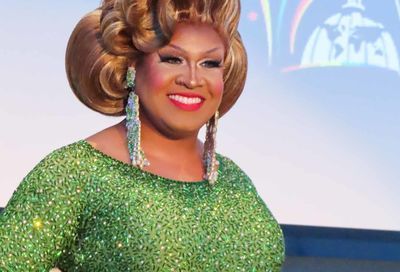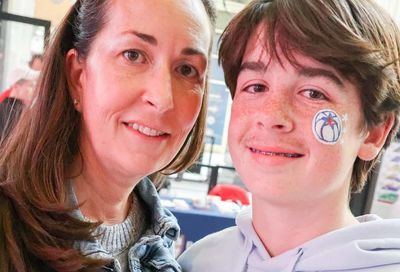‘Back to Black’ is a Flat Biopic of Amy Winehouse (Review)
The Amy Winehouse biopic "Back to Black" doesn't say much about the late artist that she didn't already sing herself.


All she really wanted, according to a voiceover that opens the flat Amy Winehouse biopic Back to Black, was for the world to hear her voice. It’s an ironic first gesture for a film that appears more intrigued by the singer’s image than the voice that propelled her lived-in, booze-soaked songs.
The movie, directed by Sam Taylor-Johnson, captures Amy’s image, fleetingly, in the portrayal by Marisa Abela. Perhaps best known (by viewers other than me) for starring in three seasons of HBO’s London-set banking drama Industry, Abela can look strikingly like the real deal when done up in full Amy Winehouse drag of thick eyeliner, jet-black beehive, and tight tube dress.
She can sound like the Grammy-winner, too, or, like a good singer mimicking Amy in scenes where the lass sits in her North London bedroom writing songs on her guitar, or bursts into a silky “Fly Me to the Moon” with her cab driver dad Mitch (Eddie Marsan) at a family birthday party.
Pictured as a Daddy’s Girl with a mentally and emotionally unstable mum, Janis (Juliet Cowan), Amy’s a quick-witted pistol aching to be seen and heard. A demonstrably dramatic person, she nevertheless didn’t fit in at drama school, we’re told, but she’s determined to find her place.
She’s already found her inspiration in the great ladies of jazz — Sarah, Ella, Billie — whose records she grew up hearing and singing along to with her dad, and her former jazz singer Nan (Lesley Manville). Nan also inspires, at least partly, Amy’s iconic look. “Oh, Nan,” Amy gushes, “you are my style icon,” which doesn’t sound like anything anybody, let alone Amy Winehouse, ever said to their grandmother.

The script by Matt Greenhalgh — a biopic specialist, who also wrote Nowhere Boy, Taylor-Johnson’s acclaimed 2009 bio of John Lennon’s early years — frequently hands Abela lumps of coal to try and squeeze into diamonds. She does her best. With her big, pleading eyes perfectly framed in close-up, Abela can sell the hardness of Amy’s cocky attitude, or the softness of a girl lost in love.
What she never really delivers is the stage presence that might electrify an audience of pop music fans. The movie makes a point of showing us that Amy also heard constructive criticism from label execs about her stage presence, so, narratively, it makes sense that we see Abela as Amy refines her stage moves over the course of the story.
But, at no point, before or after Amy improves her act, does Abela ever convincingly move like a pop star. For once, we’ll call out the film’s choreographer and movement coach, Sara Green, because whenever Abela as Amy busted out those soul-sista head rolls, all I could think was, “Please stop.” Those are the moments where the movie captures neither Amy Winehouse’s image nor her voice.
We do hear the singer’s actual voice throughout the film, on the soundtrack, and interpolated into Abela’s live performances. Following Amy’s meet-cute with future love-of-her-life Blake Fielder-Civil — Jack O’Connell, giving the film’s most charismatic performance — Amy then meets Blake’s girlfriend, a Becky (Therica Wilson-Read) in fuck-me pumps.

This, of course, leads to a live rendition of “Fuck Me Pumps,” a quintessential Amy Winehouse record off her first album Frank.
After Amy and Blake’s honeymoon love spoils, and she devolves into a messy, violent drunk, gulping vodka from the bottle, somebody pulls her aside and tells her it’s time to go to rehab. Cue up Amy Winehouse’s biggest hit “Rehab,” off second album Back to Black.
As we know from the song she wrote, they tried to tell her to go to rehab, and she said, “No, no, no,” adding, “I ain’t got the time, and if my daddy thinks I’m fine/He’s tried to make me go to rehab, but I won’t go, go, go.” In a scene that is nowhere near as moving or cool as the song, daddy Mitch says she’s fine, so she doesn’t go.
Following a pat rags-to-riches-to-alcohol-and-stitches course plotted in her autobiographical songs, the film, more or less, repeats the chronicle of Amy’s life that she already gave us. As she wanted, the world heard her voice in her music, if they won’t necessarily recognize it in this film.
What sticks here, is the image of that toppling beehive strutting on twig legs down the street to a Camden tattoo parlor, or flirting with Blake over a game of pool to “We May Never Meet Again.”
The real Amy didn’t write an ending for herself, and this film doesn’t really come up with an ending, either, just a song to send you out the door, perhaps thinking of how much you miss that voice.
Back to Black (★★☆☆☆) is now playing in theaters nationwide. Visit www.fandango.com.
Support Metro Weekly’s Journalism
These are challenging times for news organizations. And yet it’s crucial we stay active and provide vital resources and information to both our local readers and the world. So won’t you please take a moment and consider supporting Metro Weekly with a membership? For as little as $5 a month, you can help ensure Metro Weekly magazine and MetroWeekly.com remain free, viable resources as we provide the best, most diverse, culturally-resonant LGBTQ coverage in both the D.C. region and around the world. Memberships come with exclusive perks and discounts, your own personal digital delivery of each week’s magazine (and an archive), access to our Member's Lounge when it launches this fall, and exclusive members-only items like Metro Weekly Membership Mugs and Tote Bags! Check out all our membership levels here and please join us today!






















You must be logged in to post a comment.